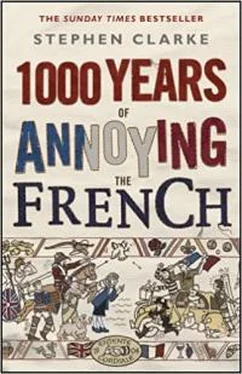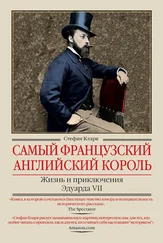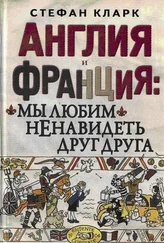Стефан Кларк - 1000 Years of Annoying the French
Здесь есть возможность читать онлайн «Стефан Кларк - 1000 Years of Annoying the French» весь текст электронной книги совершенно бесплатно (целиком полную версию без сокращений). В некоторых случаях можно слушать аудио, скачать через торрент в формате fb2 и присутствует краткое содержание. ISBN: , Издательство: Transworld Digital, Жанр: Старинная литература, на английском языке. Описание произведения, (предисловие) а так же отзывы посетителей доступны на портале библиотеки ЛибКат.
- Название:1000 Years of Annoying the French
- Автор:
- Издательство:Transworld Digital
- Жанр:
- Год:неизвестен
- ISBN:9781407067629
- Рейтинг книги:3 / 5. Голосов: 1
-
Избранное:Добавить в избранное
- Отзывы:
-
Ваша оценка:
- 60
- 1
- 2
- 3
- 4
- 5
1000 Years of Annoying the French: краткое содержание, описание и аннотация
Предлагаем к чтению аннотацию, описание, краткое содержание или предисловие (зависит от того, что написал сам автор книги «1000 Years of Annoying the French»). Если вы не нашли необходимую информацию о книге — напишите в комментариях, мы постараемся отыскать её.
1000 Years of Annoying the French — читать онлайн бесплатно полную книгу (весь текст) целиком
Ниже представлен текст книги, разбитый по страницам. Система сохранения места последней прочитанной страницы, позволяет с удобством читать онлайн бесплатно книгу «1000 Years of Annoying the French», без необходимости каждый раз заново искать на чём Вы остановились. Поставьте закладку, и сможете в любой момент перейти на страницу, на которой закончили чтение.
Интервал:
Закладка:
Napoleon Bonaparte (1769–1821), Emperor of France:
‘It is in the French character to exaggerate, to complain and to distort everything when one is not happy.’
‘History is a series of lies on which we agree.’
‘Good politics is making people believe they’re free.’
Samuel Taylor Coleridge (1772–1834), English poet:
‘Frenchmen are like gunpowder, each by itself smutty and contemptible, but mass them together and they are terrible indeed!’
Stendhal (1783–1842), French writer:
‘The French are the wittiest, the most charming, and up till now at least, the least musical race on Earth.’
Victor Hugo (1802–85), French novelist and poet:
‘To err is human. To laze about is Parisian.’
‘Let’s not be English, French or German any more. Let’s be European. No, not European, let’s be men. Let’s be humanity. All we have to do is get rid of one last piece of egocentricity – patriotism.’
Winthrop Mackworth Praed (1802–39), British politician and poet:
‘John Bull was beat at Waterloo!
They’ll swear to that in France.’
Douglas William Jerrold (1803–57), British writer:
‘The best thing I know between France and England is the sea.’
Flora Tristan (1803–44), French writer, on returning from a trip to England:
‘Traditionally, in France, the most esteemed member of society is the woman. In England, it’s the horse.’
Paul Gavarni (1804–66), French artist:
‘When an Englishwoman is dressed, she is no longer a woman, she is a cathedral. You don’t seduce her, you demolish her.’
Gustave Flaubert (1821–80), French writer, in his Dictionary of Received Ideas , a satire on French prejudices:
‘Anglais: All rich.
Anglaises: Act surprised that they have good-looking children.
Français: Most important people in the universe.
John Bull: When you don’t know an Englishman’s name, call him John Bull.
Monarchie: A constitutional monarchy is the best kind of republic.
Stuart (Marie): Act sorry for her.’
Mark Twain (1835–1910), American writer:
‘In Paris they simply stared when I spoke to them in French. I never did succeed in making those idiots understand their language.’
Georges Clemenceau (1841–1929), French Prime Minister:
‘English is just badly pronounced French.’
Paul Claudel (1868–1955), French writer:
‘American democracy made its entrance into the world on the arm of the French aristocracy.’
André Gide (1869–1951), French writer and winner of the Nobel Prize for Literature:
‘It is unthinkable for a Frenchman to arrive at middle age without having syphilis and the Légion d’Honneur.’
Harry Graham (1874–1936), English writer:
‘Weep not for little Léonie,
Abducted by a French marquis,
Though loss of honour was a wrench,
Just think how it’s improved her French.’
George S. Patton (1885–1945), American general:
‘I would rather have a German division in front of me than a French one behind me.’
Charles de Gaulle (1890–1970), French President:
‘I have tried to lift France out of the mud. But she will return to her errors and vomitings. I cannot prevent the French from being French.’
‘When I want to know what France thinks, I ask myself.’
Richmal Crompton (1890–1969), British writer, creator of the children’s book hero William Brown, who, in her novel William the Conqueror , says:
‘I don’ wanter talk to any French folks, an’ if they wanter talk to me they can learn English. English’s easy to talk. It’s silly having other langwidges. I don’ see why all the other countries shun’t learn English ’stead of us learnin’ other langwidges with no sense in ’em. English’s sense.’
Evelyn Waugh (1903–66), British writer:
‘We are all American at puberty. We die French.’
Josephine Baker (1906–75), American dancer:
‘I like Frenchmen very much, because even when they insult you, they do it so nicely.’
Billy Wilder (1906–2002), Austrian-American film director:
‘France is a place where the money falls apart in your hands but you can’t tear the toilet paper.’
(This was before the euro was created and became stronger than the dollar.)
Georges Elgozy (1908–89), French economist:
‘A Frenchman needs a year to understand English money, ten years to understand their temperament, fifty years for their lack of temperament, and an eternity for their women.’
Pierre-Jean Vaillard (1918–88), French actor:
‘Now I know why the English prefer tea. I just tasted their coffee.’
Boris Vian (1920–58), French writer and jazz musician:
‘To do business these days, you have to be American. But if you can content yourself with being intelligent, you might as well just be French.’
‘Ridicule won’t kill you anywhere, but in America it will make you rich.’
Claude Gagnière (1928–2003), French writer:
‘A man who speaks three languages is trilingual. A man who speaks two languages is bilingual. A man who speaks one language is English.’
William Safire (b. 1929), American journalist:
‘One difference between French appeasement and American appeasement is that France pays ransom in cash and gets its hostages back while the United States pays ransom in arms and gets additional hostages taken.’
Édith Cresson (b.1934), French Prime Minister, angry that men weren’t ogling her during a visit to London
‘One in four Englishmen is gay.’
‘The Anglo-Saxons are not interested in women as women – it is a problem with their upbringing – I think it’s a sort of disease.’
Jean-Jacques Annaud (b. 1943), French film director:
‘When Americans make movies they aim at the entire planet. When the French make movies, they aim at Paris.’
Anonymous French person :
‘English cooking: if it’s cold, it’s soup. If it’s warm, it’s beer.’
Select Bibliography
The bibliography in a history book is sometimes so long that you wonder how the author had time to eat, sleep and go to the loo while they were doing the research. And most of them contain only a few lines that are of any relevance to the subject in hand.
I am therefore listing only the books that I’ve either read in their entirety, or read big chunks of, and would be happy to recommend to other people.
I must admit, though, that I didn’t always flick through their yellowing pages myself. Luckily, these days, lots of libraries are putting their old books on scanners that do the flicking for us. This could be said to encourage laziness, but it’s also miraculous because it means that the sources of Anglo-French history are no longer limited to researchers with access to rare and fragile documents. It is now relatively easy for anyone with a computer and a taste for hunting through online book catalogues to read medieval chronicles, seventeenth-century autobiographies and eighteenth-century travel books and see what people were actually saying about events at the time they happened.
This is why many of the books listed below are out of print, but can be found via websites like gutenberg.org, archive.org, Google booksor (for French texts) gallica.bnf.fr. You will have to read them online, but that might be more convenient than going in person to the East Louisiana Library of pre-Napoleonic Colonial Affairs.
Getting access to a medieval chronicle doesn’t always mean you can understand it, of course, but the pleasant thing about French is that it has changed very little over the centuries, and you only need a short course in medieval vocabulary and grammar to be able to understand fourteenth-century texts in the original. Shakespeare’s English is incomprehensible by comparison.
Читать дальшеИнтервал:
Закладка:
Похожие книги на «1000 Years of Annoying the French»
Представляем Вашему вниманию похожие книги на «1000 Years of Annoying the French» списком для выбора. Мы отобрали схожую по названию и смыслу литературу в надежде предоставить читателям больше вариантов отыскать новые, интересные, ещё непрочитанные произведения.
Обсуждение, отзывы о книге «1000 Years of Annoying the French» и просто собственные мнения читателей. Оставьте ваши комментарии, напишите, что Вы думаете о произведении, его смысле или главных героях. Укажите что конкретно понравилось, а что нет, и почему Вы так считаете.












